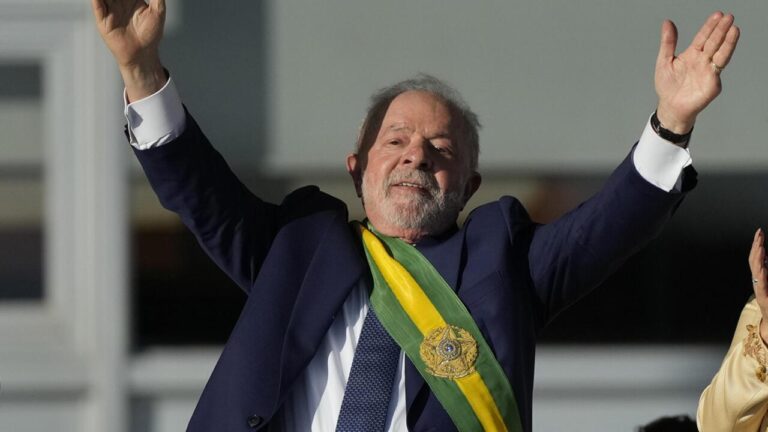Brazilian President Luiz Inácio Lula da Silva has announced his intention to run for a historic fourth term in office at the age of 80. Speaking to supporters and the media, Lula emphasized his enduring vigor and commitment to the country’s future, declaring, “I’ve got as much energy as when I was 30.” The former union leader and three-time president, who has been a dominant figure in Brazilian politics for decades, is poised to challenge rivals in the upcoming presidential race, setting the stage for a highly contested election in South America’s largest democracy.
Brazilian President Announces Bid for Fourth Term Emphasizing Youthful Energy and Experience
At the age of 80, the Brazilian president has officially declared his intention to pursue an unprecedented fourth term in office, underscoring a blend of seasoned wisdom and energetic vigor. Rejecting notions that age might slow his political drive, he confidently stated, “I’ve got as much energy as when I was 30.” This move marks a significant moment in Brazilian politics, reflecting a strategy that combines his extensive experience with a robust vision aimed at younger generations. Analysts note his campaign will likely focus on both continuity and reinvention, appealing to a broad spectrum of voters amid a polarized political landscape.
The president’s announcement outlines several key priorities that highlight his commitment to innovation and stability. These include:
- Advancement of digital infrastructure to attract investment and modernize the economy
- Strengthening youth employment programs to combat unemployment rates among younger citizens
- Environmental initiatives aiming to balance economic growth with Brazil’s natural resources preservation
A recent survey illustrates public perception of his leadership qualities, broken down by age groups:
| Age Group | Support % | Main Concern |
|---|---|---|
| 18-30 | 45% | Job Opportunities |
| 31-50 | 52% | Economic Stability |
| 51 and above | 61% | Healthcare and Security |
Implications of an 80-Year-Old Leader on Brazil’s Political Landscape and Governance
At 80 years old, the president’s bid for a fourth term marks a significant moment in Brazil’s political narrative, challenging traditional views on leadership vitality and experience. His declared energy level, comparable to that of a 30-year-old, sparks a broader debate about age and governance efficacy in a country often yearning for dynamic change yet respecting seasoned authority. Critics argue that longevity in power might risk stagnation and resistance to innovation, while supporters emphasize the benefits of accumulated wisdom and resilience in a complex political environment.
Governance under an octogenarian leader also reshapes expectations across several dimensions:
- Policy consistency: Potential for long-term strategic planning, given the leader’s extensive tenure and familiarity with state machinery.
- Succession uncertainty: Raises questions about political renewal and grooming of future leaders within the ruling party.
- Public health and stamina: Concerns about the physical and mental demands of presidential duties at an advanced age.
- International perception: Positions Brazil as a country led by one of the world’s eldest heads of state, affecting diplomatic dynamics.
| Aspect | Potential Impact | Public Concern |
|---|---|---|
| Experience | Deep institutional knowledge and political savvy | Risk of outdated approach |
| Energy Levels | Asserted vitality and stamina | Age-related health risks |
| Policy Direction | Consistency and predictability | Resistance to reforms |
| Political Stability | Steady leadership amid turmoil | Potential leadership vacuum in case of sudden changes |
Expert Recommendations on Voter Engagement and Policy Priorities Ahead of the Upcoming Election
As Brazil’s political landscape intensifies with the president’s bid for an unprecedented fourth term, experts stress that voter engagement strategies must evolve to address both the aging electorate and the younger demographic increasingly active on digital platforms. Effective outreach combines traditional methods such as community town halls and targeted mail campaigns with modern tactics like social media activism and interactive virtual forums. Analysts emphasize the importance of clear communication around policy priorities to avoid misinformation and voter apathy, particularly among first-time voters who represent a growing force capable of shifting election outcomes.
Policy discussions ahead of the election revolve largely around socioeconomic stability, healthcare reforms, and sustainable environmental management. Experts recommend that campaigners prioritize these key issues:
- Economic resilience: Solutions addressing inflation and job creation
- Healthcare accessibility: Strengthening public health systems post-pandemic
- Climate policies: Balancing economic growth with Amazon conservation
- Education reform: Modernizing curricula to meet 21st-century demands
| Priority Area | Recommended Action | Potential Impact |
|---|---|---|
| Economic Resilience | Implement stimulus packages and support for SMEs | Boost employment & consumer confidence |
| Healthcare | Expand vaccination programs & hospital funding | Improve public health & reduce mortality rates |
| Environmental Policy | Enforce stricter protections of Amazon rainforest | Preserve biodiversity & international reputation |
| Education | Invest in digital learning infrastructure | Enhance skills & reduce educational inequality |
To Conclude
As Brazil’s political landscape prepares for another pivotal election, President Luiz Inácio Lula da Silva’s bid for a fourth term at the age of 80 underscores both his enduring influence and the deep divisions within the country. With a campaign anchored in experience and resilience, Lula faces a challenging contest amid economic uncertainties and social debates. The coming months will be crucial in determining whether his pledge of sustained energy and leadership will resonate once again with Brazilian voters.




